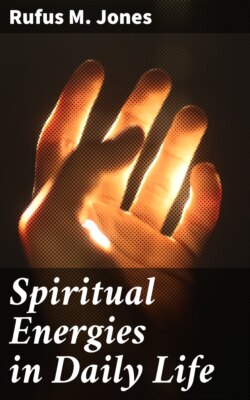Читать книгу Spiritual Energies in Daily Life - Rufus M. Jones - Страница 7
На сайте Литреса книга снята с продажи.
I
PEACE THAT PASSES UNDERSTANDING
ОглавлениеTable of Contents
We are all familiar with the coming of a peace into our life at the terminus of some great strain or after we have weathered a staggering crisis. When a long-continued pain which has racked our nerves passes away and leaves us free, we suddenly come into a zone of peace. When we have been watching by a bedside where a life, unspeakably precious to us, has lain in the grip of some terrible disease and at length successfully passes the crisis, we walk out into the fields under the altered sky and feel a peace settle down upon us, which makes the whole world look different. Or, again, we have been facing some threatening catastrophe which seemed likely to break in on our life and perhaps end forever the calm and even tenor of it, and just when the hour of danger seemed darkest and our fear was at its height, some sudden turn of things has brought a happy shift of events, the danger has passed, and a great peace has come over us instead of the threatened trouble. In all these cases the peace which succeeds pain and strain and anxiety is a thoroughly natural, reasonable peace, a peace which comes in normal sequence and is quite accessible to the understanding. We should be surprised and should need an explanation if we heard of an instance of a passing pain or a yielding strain that was not followed by a corresponding sense of peace. One who has seen a child that was lost in a crowded city suddenly find his mother and find safety in her dear arms has seen a good case of this sequential peace, this peace which the understanding can grasp and comprehend. We behold it and say, “How otherwise!”
There is, St. Paul reminds us, another kind of peace of quite a different order. It baffles the understanding and transcends its categories. It is a peace which comes, not after the pain is relieved, not after the crisis has passed, not after the danger has disappeared; but in the midst of the pain, while the crisis is still on, and even in the imminent presence of the danger. It is a peace that is not banished or destroyed by the frustrations which beset our lives; rather it is in and through the frustrations that we first come upon it and enter into it, as, to use St. Paul’s phrase, into a garrison which guards our hearts and minds.
Each tested soul has to meet its own peculiar frustrations. All of us who work for “causes” or who take up any great piece of moral or spiritual service in the world know more about defeats and disappointments than we do about success and triumphs. We have to learn to be patient and long-suffering. We must become accustomed to postponements and delays, and sometimes we see the work of almost a lifetime suddenly fail of its end. Some turn of events upsets all our noble plans and frustrates the result, just when it appeared ready to arrive. Death falls like lightning on a home that had always before seemed sheltered and protected, and instantly life is profoundly altered for those who are left behind. Nothing can make up for the loss. There is no substitute for what is gone. The accounts will not balance; frustration in another form confronts us. Or it may be a breakdown of physical or mental powers, or peradventure both together, just when the emergencies of the world called for added energy and increased range of power from us. The need is plain, the harvest is ripe, but the worker’s hand fails and he must contract when he would most expand. Frustration looks him straight in the face. Well, to achieve a peace under those circumstances is to have a peace which does not follow a normal sequence. It is not what the world expects. It does not accord with the ways of thought and reasoning. It passes all understanding. It brings another kind of world into operation and reveals a play of invisible forces upon which the understanding had not reckoned. In fact, this strange intellect-transcending peace, in the very midst of storm and strain and trial, is one of the surest evidences there is of God. One may in his own humble nerve-power succeed in acquiring a stoic resignation so that he can say,
“In the fell clutch of circumstance
I have not winced nor cried aloud.
Under the bludgeonings of chance
My head is bloody, but unbowed.”
He may, by sheer force of will, keep down the lid upon his emotions and go on so nearly unmoved that his fellows can hear no groan and will wonder at the way he stands the universe. But peace in the soul is another matter. To have the whole heart and mind garrisoned with peace even in Nero’s dungeon, when the imperial death sentence brings frustration to all plans and a terminus to all spiritual work, calls for some world-transcending assistance to the human spirit. Such peace is explained only when we discover that it is “the peace of God,” and that it came because the soul broke through the ebbings and flowings of time and space and allied itself with the Eternal.
